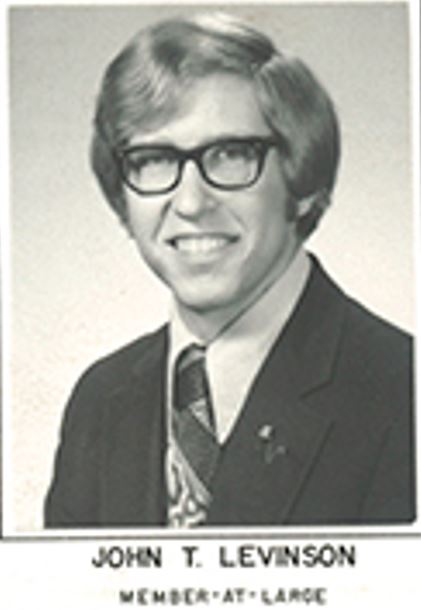 Let’s call him our “Michigan Delta Chi Fraternity Iron Horse.” That’s a phrase that implies endurance and longevity. You’ll learn why that is appropriate, in so many ways, as you read history of the most significant Michigan Delta Chi since its origin in 1892.
Let’s call him our “Michigan Delta Chi Fraternity Iron Horse.” That’s a phrase that implies endurance and longevity. You’ll learn why that is appropriate, in so many ways, as you read history of the most significant Michigan Delta Chi since its origin in 1892.
An Ann Arbor area native, John Levinson (BBA ’73/MBA ’75) joined Delta Chi in the fall of his freshman year in 1969 and has been dedicated to the Fraternity ever since.
He actually moved into the house in November of 1969. The university had overbooked and did not have enough rooms for freshmen to live in the dorms, so they were looking to get people to live elsewhere. John moved in as a first semester freshman. He’ll tell you that a major selling point for joining Delta Chi was that the fraternity had recently hired a former Army cook named John Henry Russell. Our Iron Horse (longevity and endurance exhibit 1) lived in the Chapter house for 5 and a half years, until receiving his master’s in 1975. This bonded him forever to the fraternity.
From the beginning, John assumed leadership roles. He was recording secretary in the spring and fall of 1970 and a member at large in the spring of 1973. The fraternity was not doing particularly well in rush in those days, so they elected him as chairman of the rush committee, a position he held for five years.
As a sophomore, junior, and senior the Chapter succeeded under his leadership role for Rush; maintaining the house around 22 members. But in his first year pursuing his MBA, the active members were unable to gain any pledges during the fall and winter rush. Responding to an urgent request in February 1974 to lead a 2nd rush campaign, John applied a lesson he had already learned in his business studies… how to cut a deal. He would manage a late Rush if he could continue to live in the Chapter house for his final year AND keep his single room. In February, his efforts resulted in 7 pledges in 7 days. His brother, David ‘75, was not happy since he was in line as a senior to get the popular room that John lived in (referred to as “Bear’s Room” in John’s honor). David… we thank you for that sacrifice so many years ago!
John was also elected chairman of the athletic committee for each of those 5 years, trying to get participation for different sports and games. As a freshman he went out for the University’s lacrosse team, even though he’d never played the game as it was not a sport played in Michigan high schools at the time. He played on the second mid-field in the first game in his freshman season. He was sandwiched between one guy from Yale who was in business school and another from Harvard who was in law school – guess who did all the dirty work on that line. He played and lettered for 4 years total, missing sophomore year because of an injury but then playing during his first year in business school. Playing lacrosse became important later, as we shall see.
He was asked to join the Delta Chi board in the spring of 1976 because no one on the board knew about insurance requirements and they thought his business school experience would be helpful. Fortunately, he had taken insurance classes at the Business School.
While attending board meetings, John was impressed with how board president Duncan Kretovich ’66, ran each meeting. Duncan was a Michigan Delta Chi alum who had become a faculty member at the University. Duncan was extremely organized and focused, demonstrating a high level of professionalism as he got the business of the fraternity done. John decided that he liked Duncan’s style and has emulated it since. John became vice-president on the board in the early 1980s and represented Delta Chi at the newly formed Alumni Fraternity Council which the University of Michigan was emphasizing. He served as president of the board from 1992 to 1997, when he resigned to take over as treasurer of the fraternity, a position that more closely matched his interests and talents. He still maintains that role today (endurance and longevity)!
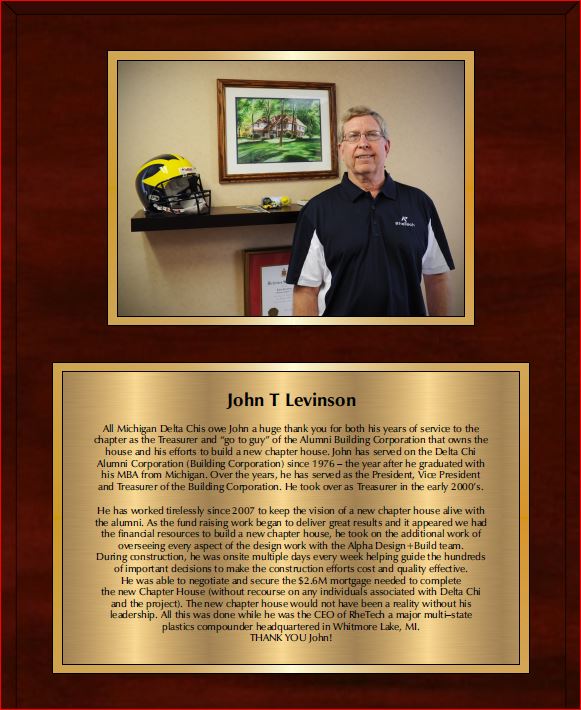
The position of treasurer of any organization is often undervalued, with the attention mostly focused on the president. Treasurer may actually be the most important position. It is the treasurer, often behind the scenes, who keeps the fraternity operating. As the Delta Chi board treasurer, John writes the checks and deals with finding the various vendors coming into the house. He does everything having to do with the finances including preparing and submitting the tax returns and dealing with the banks to secure and pay off our loans. In practice and effect, he also serves as the fraternity’s landlord –keeping track of renting the rooms, managing incoming payments and student accounts, managing various issues that came up including repairs in the house, and even fielding issues related to parties and complaints/police reports. Basically, John handles any issue arising in the house.
The Death and Rebirth of Michigan Delta Chi
The membership numbers of Michigan Delta Chi severely decreased in the early 2000s. At one point, the national fraternity warned the chapter that if they couldn’t maintain at least 10 active members, they would pull the charter. This happened in 2003. John stepped in once again. Rather than dissolving the fraternity and selling the building, he decided to keep it going by renting the rooms out to other university students, helping to pay the bills and maintain the house.
Historically, the national fraternity does not attempt to recolonize chapters that cease to exist on campus for at least 5 years. Thankfully, another alumnus, Jeff Schoenherr ’91, stepped up to assist in getting the chapter reestablished. Jeff had many contacts at the National and leveraged those to move the concept forward. Due to Jeff’s effort and based largely on John’s foresight in keeping the house, the national returned to help re-start the chapter in 2006. A group of students, led by Armando Ledesma ’06, re-established the house.
One of the issues that resulted in the decline of members, was the state of the old chapter house at 1705 Hill St.
Originally built as a single-family residence in 1906, maintaining a house filled with up to 24 fraternity members each year became a struggle. In the 1980s and 1990s the cost of repairs increased significantly: The communal shower had to be refurbished at least 3 times; the roof had to be replaced twice; changes in the fire codes called for the installation of additional walls (necessitating room reconfigurations) and fire doors; screens on all the windows had to be replaced; and significant problems with the foundation were discovered. Ann Arbor, which has very pro-resident renter’s codes, inspected the house every 1-2 years but the results were increasingly uncertain. In fact, the passing grades the house did receive were due in no small part to the fact that John had known the building inspector for over 10 years and the inspector was willing to work with John and the Board on mitigation issues to maintain occupancy.
Eventually, it was John who picked up the mantra made famous by Cal State Fullerton Delta Chi alumnus Kevin Costner ’78, in his 1989 movie “Field of Dreams” — “If you build it, he (they) will come.” If you build a new Michigan Delta Chi Fraternity at 1705 Hill St, members will come.
His thought dove-tailed with three other Michigan Delta Chis – David Falconer ‘62, Frank Morrey ‘64, and Howard Gandelot ‘64 had been talking off and on for years about building a new chapter house. But it was only when they put their heads together with John that they decided to begin to raise the money necessary to build the new Delta Chi. Shortly after, Keith Hellems ‘62 was added to complete the team.
At this point in the story, another one of John’s acquaintances came into the picture. Allan Lutes was a Delta Tau Delta who in the early 1980’s started to bring fraternities together into an alumni interfraternity council for the university. Al, with the encouragement of John, went on to develop the Alpha company, which managed fraternity properties in the Ann Arbor area and subsequently in multiple states across the country. That friendship with Allan proved extremely helpful in the building of the new house and is key to the current and future management of the house.
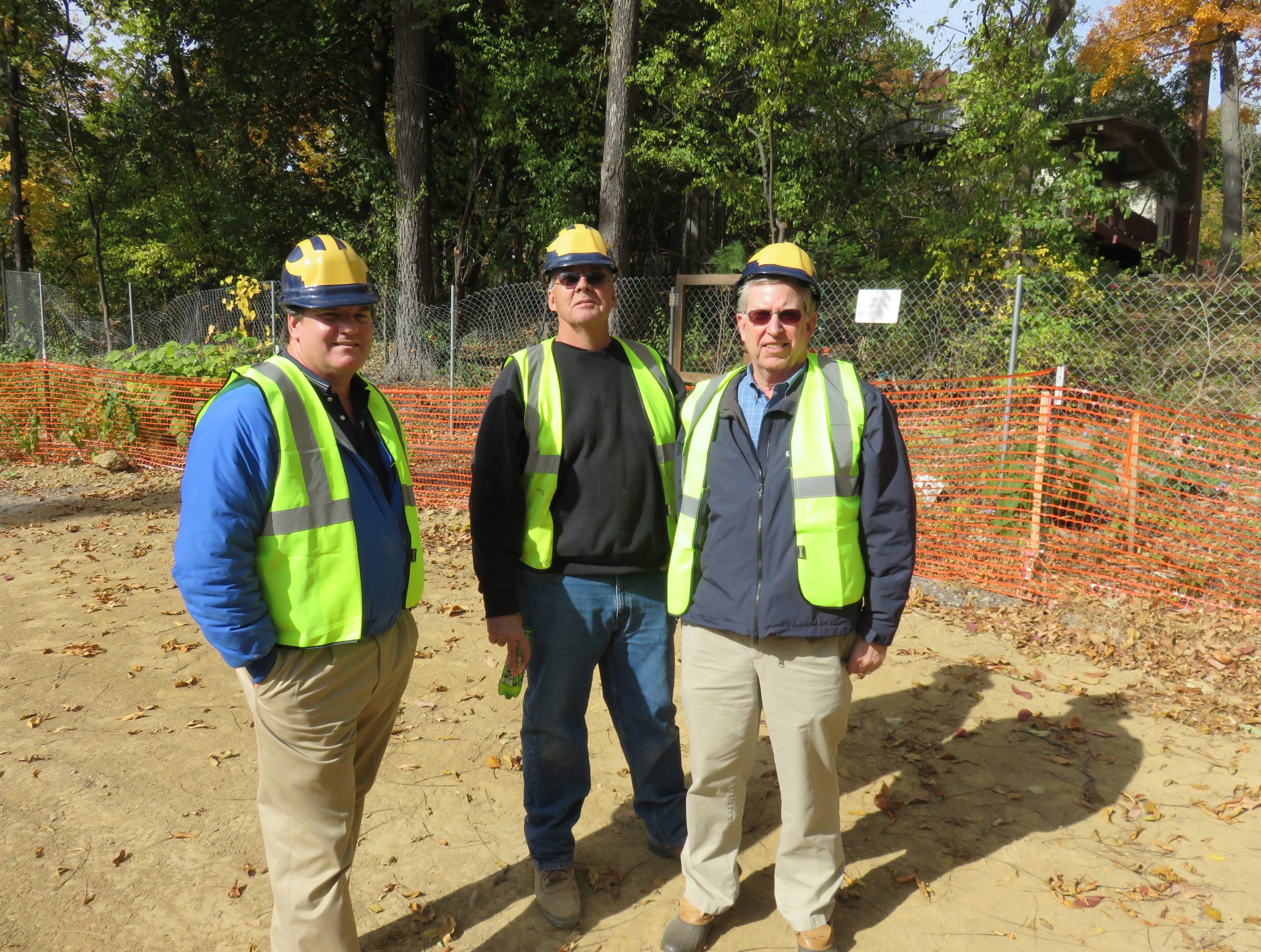
The Delta Chi alums decided to build the fraternity house so that it would have a striking resemblance to the old house in the hopes that this would help bring the nostalgia factor out and increase alumni donations to the project. Once again, John – along with Howard Gandelot – was on the ground floor, developing the actual architectural drawings that were being developed by Alpha. The proposed house was the only completely new fraternity house constructed on the Ann Arbor campus since well before the 1960’s.
During all phases of the subsequent demolition and construction, John was there on almost a daily basis to ensure that things were going as smoothly as planned and that the contractors were meeting their obligations.
When costs were initially estimated, the building processes in Ann Arbor were quite slow and area contractors were hungry for work. When the bids finally went out, the responses were all well beyond our contingency of 5% factor for a $2.3M plan. By the time the project was completed, the final numbers (not including mortgage costs) had ballooned to approximately $3.5M or $1.2M over the budget and the financing commitment the group had from the Bank of Ann Arbor.
Given the focus of this article, it is no surprise, then, that it was John Levinson who stepped up to the plate again. The financing story continues to prove that timing is everything. Long story short – going back to the bank for an increase that was close to DOUBLE over their commitment took more than a little “finesse.” It took A LOT OF FINESSE by John, who was the person negotiating the loans. Some good luck also played a part.
When things were getting very dicey with the bank, because of the costs and needs increase, John realized that what we had to sell was a still a very good equity to value ratio (our skin in the game was going to be roughly 33%). The other thing to sell was the design concept, and the fact that rents were continuing to escalate for dorms and apartments in Ann Arbor and on campus. The final move in John’s chess game was to get the Loan Officer out to visit the building site (we were in the framing of the 3rd floor at the time) with Allan Lutes and John. This “sales pitch” worked to clinch the loan for two reasons – first, we had a very good commercial concept and design and second – the bank and the Loan Officer were very familiar with and deeply respected Lutes and Alpha Management. The bank had done many successful projects with Allan and Alpha. They felt very comfortable with him being the general contractor and future manager for the property.
Finally, the timing/luck part…
When it came to final decision time, John went to the Bank of Ann Arbor headquarters in downtown Ann Arbor to meet with the Loan Officer and his boss – the final decision-maker (the mysterious Boss/Decision-maker who you never get to meet or see in the auto dealership or similar setting). Before the meeting, the Boss/Decision-maker asked the Loan Officer to find out if John had played Lacrosse for Michigan in the early 1970s. John asked the Loan Officer how he knew that and why that was important. It turns out that the decision-maker was the second-string goalie for the Lacrosse team that John had played on for four years at Michigan. His memory of John convinced him that if John was also involved in the current and future management of the project then the bank would increase the loan commitment for the full amount that we needed to finish the house.
John had not talked with or seen Charley Krone (the Boss/Decision-maker and former goalie), since his last Michigan Lacrosse game in 1974. John also found out that they had investigated his business career at RheTech (including that he was local living in Commerce Township, Michigan) and determined that John was a person that they were most comfortable with as the Alumni boots-on-the-ground lead for the project. John had to promise to stay on the Delta Chi Board for the length of the loan (5 years) as a condition for the deal to proceed.
Both the Loan Officer and Charley Krone have now retired and the loan with Bank of Ann Arbor has since been renewed for another seven years. As fate would have it, they were replaced by John’s old JP Morgan Chase Loan Manager for the RheTech business, so it looks like John will have to stay around until the current loan expires in another five years and the loan again renewed!

With the new fraternity house finished, it became clear that the Chapter dynamics had drastically changed. Instead of 20-30 total active members as in the old days (with many upper-class Members living in the House), the fraternity membership soared to over 100 – with only 34 Sophomores’ living in the House each year – “If you build it, they will come” – indeed!
This was why John had built up the relationship with Alpha Management – they would replace him for the very much increased workload of – signing contracts to live in the house, providing maintenance and monitoring the expenses of the house on a day and weekly basis. This could no longer be done by a volunteer Alumnus like John had done for so many years.
In the old days – with a much smaller house – it was much easier to build and maintain the Bonds that make Delta Chi so unique. It was also much easier for John and “BB” Al Knaus ’66 to build and maintain relationships with the active leadership and the members. Since the house has expanded, it has become much more difficult and the opportunities for engagement are occurring less and less. In addition, finding volunteers to share the work was not successful. John has realized that getting someone to take his place is going to be an extremely difficult problem for Delta Chi alumni to solve. Therefore, in his own quiet, behind-the-scenes- manner, he’s started to put a succession plan in play. One major step – Alpha Management reduces the workload he has personally sustained. The vast majority of the day-to-day management of the Chapter House have been delegated to Alpha, who now has a long and successful relationship with the Fraternity.
It is time to pass the torch and not let the flame go out. As Blake Corum stated – Business finished!!
The “Iron Horse”
John is not the first person to earn the title of “Iron Horse.”
In the 1920s and into the 1930s, professional baseball player and first-baseman for the New York Yankees (1923-1939), Lou Gehrig, earned that title for his prowess as a hitter and his durability. He played in 2,130 consecutive games, a record that lasted for 56 years. His streak came to an end in 1939 when he voluntarily took himself out of the line-up due to a then-undiagnosed ailment, subsequently confirmed to be amyotrophic lateral sclerosis (ALS). ALS is a neuromuscular illness that results in the progressive loss of muscle control. The disease is now known colloquially as Lou Gehrig’s Disease.
Like his nickname namesake, John was diagnosed with ALS about 1.5 years ago after several years of prodromal symptoms. Despite the disease, John continues to be CEO at RheTech and is also working hard to maintain his streak of 55+ years in service to Michigan Delta Chi.
At the same time, he is fighting to maintain another long streak that gives credence to the Iron Horse moniker. As previously covered in the eDelt, John is famous in Michigan football circles for having the record for attending 587 straight University of Michigan football games – home, away, and bowl – a record that began January 1, 1976.
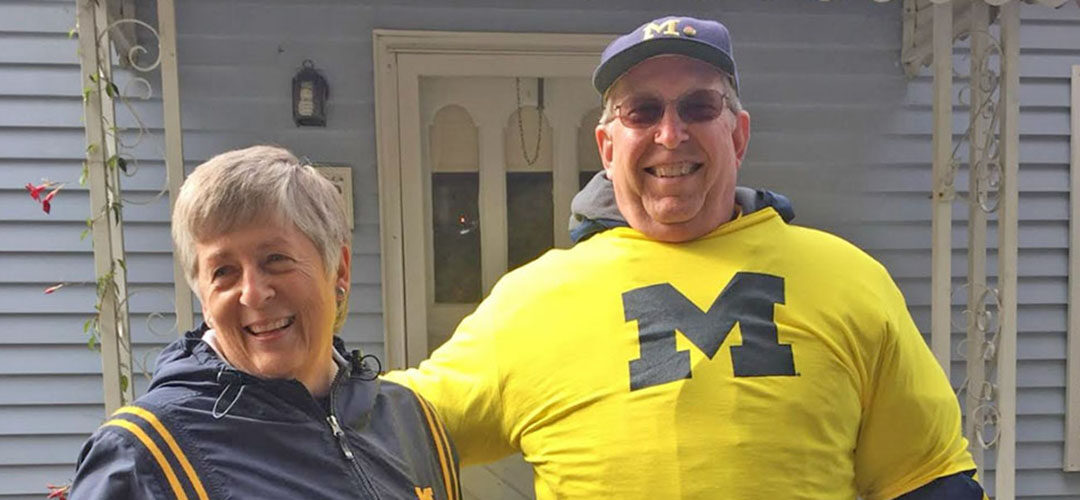
On the professional front, John’s longevity habit continued when he was hired as the Chief Financial Officer of RheTech Corporation 37 years ago. He has served as the company’s president for the last 17 years, with the provision that he would be taking no Saturday meeting during Michigan football season.
Iron Horse indeed.
John has been a consistent leader in Delta Chi fraternity since he joined in 1969. His durability, dedication, sense of responsibility, and organizational abilities have been simply outstanding and have certainly proven him to be the most important person to join the Brotherhood of the University of Michigan Delta Chi Fraternity since its founding in 1892. Not a single other member even comes close to what he’s done over the years for us, much of it behind the scenes.
Let’s raise our glasses to toast this great Michigan Delta Chi, our MVP and Iron Horse, John Levinson!
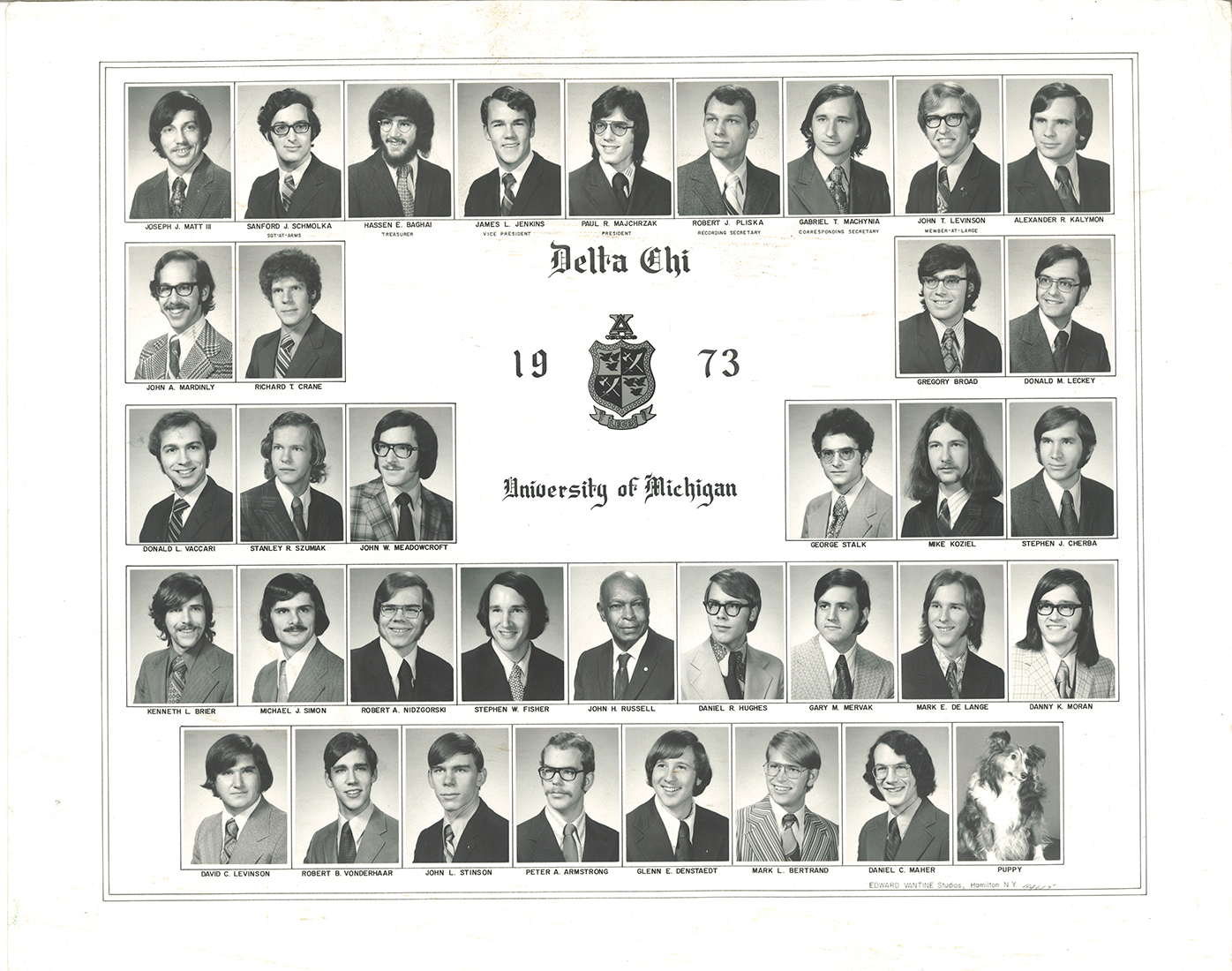
Article written by H. Keith Hellems, Jr. MD, ’62 and Joe Gradisher ‘79
